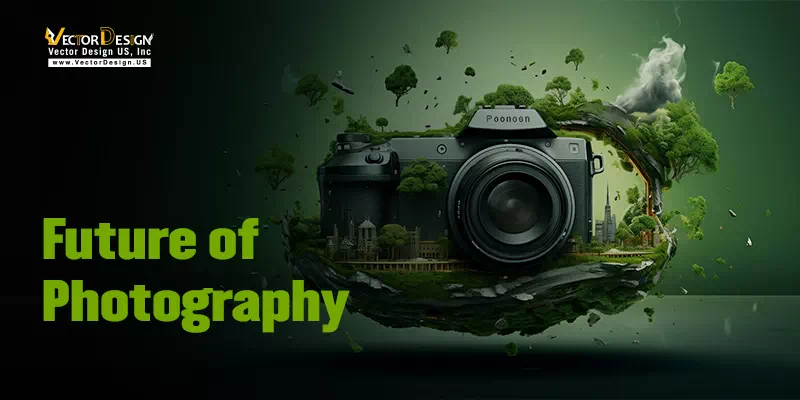Photography is the art and science of capturing and preserving visual images. It has undergone a remarkable evolution over time. This evolution encompasses not only advancements in technology but also shifts in creative approaches. As we delve into the future of photography, we’ll explore how this medium has transformed from its origins to the dynamic and multifaceted entity it is today. We’ll uncover the exciting journey that photography has embarked upon and glimpse the possibilities that lie ahead.
Photography speaks to our emotions, stories and identities. In today’s world, it’s a universal tool for communication, memory preservation, self-expression and cultural reflection. It shapes how we see and share the world.
You may also read– photography post production
What is the Future of Photography?
The future of photography refers to the evolving landscape of this visual art form, driven by technological advancements, creative innovations and shifts in societal and cultural contexts. It encompasses emerging trends, techniques and possibilities that will shape how photography is practiced, experienced and interpreted in the coming years.
Predictions About the Future of Photography
Predicting the exact future of any technology is challenging, but here are some potential trends and developments that could shape the future of photography:
AI-Enhanced Photography

Artificial intelligence is set to revolutionize photography by boosting image quality, scene optimization and workflow efficiency. From automatic adjustments to advanced editing, AI will empower photographers to achieve greater precision and creativity. This transformative technology will reshape the art of photography, enhancing both the process and the final result for professionals and enthusiasts alike.
Immersive Photography

Photography will become a gateway to immersive experiences, merging with virtual and augmented reality to transport viewers into interactive visual realms. This trend will redefine storytelling, allowing photographers to create immersive narratives that engage the senses and offer new dimensions of exploration beyond traditional static images.
Light Field Photography

The future of photography holds exciting potential with innovations like Light Field Photography. This technology captures not just the intensity of light in a scene but also its direction, allowing for interactive refocusing. Light Field Photography promises to redefine how we perceive and interact with images.
Advanced Mobile Photography

Mobile devices will continue to evolve with improved sensors, optics and computational capabilities. It is the bridge between traditional cameras and smartphones. This trend will empower users to capture high-quality images on-the-go, fostering a new wave of creativity and accessibility in photography.
Ethical and Privacy Concerns

As photography becomes more pervasive, discussions surrounding consent, image manipulation, and data privacy will intensify. Striking a balance between creative expression and respecting individual rights will become crucial, shaping regulations and practices that govern the ethical use of images in various contexts.
Drone Photography

Drone photography technology will continue to expand photography’s horizons by offering unique aerial perspectives. This trend will lead to captivating aerial imagery in fields like architecture, landscape and cinematography. It also raise discussions about airspace regulations and responsible drone operation.
Sustainability and Eco-Friendly Practices

The photography industry will increasingly adopt sustainable practices, utilizing eco-friendly materials. This shift will reflect a growing awareness of environmental impact. It inspires photographers to contribute positively to the planet while producing visually compelling and responsible content.
Instant Sharing and Printing

Instant sharing and printing technologies will enable photographers to swiftly share their work with a global audience. This trend will lead to real-time engagement and tangible photo experiences. It will teach how images are enjoyed and appreciated by both creators and viewers.
3D Photography

The evolution of 3D imaging technology will bring depth and dimension to photography. Photographers will capture scenes in three dimensions, providing a more immersive and lifelike viewing experience. This advancement will impact various industries, from entertainment to education.
Holographic Imaging

Holographic technology will introduce a new level of realism to photography. This development will redefine how photographs are displayed and experienced, merging the boundaries between the physical and digital worlds. This trend offers viewers a truly captivating visual encounter.
Photography as Data

Photography will become an integral part of data-driven processes, contributing to fields like artificial intelligence and machine learning. Images will be used to train algorithms, analyze patterns and provide insights.
Impact of future photography
The future of photography is likely to have a significant impact on various aspects of society, technology and culture. Let’s explore essential impacts of future photography:
- Visual Communication: Photography will continue to be a powerful tool for visual communication. It will play a crucial role in conveying messages, telling stories and sharing information in a visually compelling way.
- Artistic Expression: Advances in technology and new creative possibilities will enable photographers to explore innovative artistic expressions, pushing the boundaries of traditional photography and creating new forms of visual art.
- Documenting History and Culture: Future photography will serve as a valuable historical and cultural record. It will capture the moments and experiences for future generations to understand and appreciate.
- Social Media and Influencer Culture: Photography will remain integral to social media platforms, influencing trends and shaping the way people present themselves and their lives online.
- Marketing and Advertising: Businesses and brands will continue to rely on photography to create impactful advertising campaigns, product visuals and promotional content.
- Science and Research: Photography will contribute to scientific research and discoveries in fields like astronomy, biology and archaeology.
- Education and Documentation: Photography will be increasingly integrated into educational materials and documentation. This thing will enhance learning experiences and knowledge dissemination.
- Personal Memories and Reflections: As photography becomes more immersive and interactive, it will play a crucial role in preserving personal memories and allowing individuals to reflect on their lives.
- Cultural Exchange and Understanding: Photography will facilitate cultural exchange and understanding by providing glimpses into the lives and traditions of people from different parts of the world.
- Environmental Awareness: Photography will continue to raise awareness about environmental issues, capturing the beauty of nature as well as the impact of human activities on the planet.
Will Photography be a Profitable Career?
Photography can be a profitable career, but success in this field depends on a variety of factors. Here are some key considerations:
- Skill and Creativity: Your technical skills, artistic creativity and ability to capture compelling images will play a significant role in your success as a photographer.
- Market Demand: The demand for photography services can vary based on factors such as location, industry trends and types of photography.
- Networking: Building a strong professional network can lead to referrals, collaborations and opportunities that contribute to your profitability.
- Adaptability: The photography industry is evolving due to technological advancements. Being adaptable to new tools, techniques and trends is important for staying competitive.
- Quality and Consistency: Consistently delivering high-quality work and meeting or exceeding client expectations is crucial for building a solid reputation.
- Marketing and Branding: Effective marketing strategies, including online presence, social media and branding, can help you attract clients and build a loyal customer base.
- Portfolio: A strong and diverse portfolio showcases your skills and helps potential clients understand your style and capabilities.
- Continuous Learning: Staying updated on industry trends, new technologies and improving your skills over time is essential for long-term profitability.
- Competition: The photography industry can be competitive with varying levels of competition based on your location and specialization.
Conclusion
The future of photography is bright. It will play a great role in the professional fields. Embracing the future of photography requires photographers to stay curious and adaptable. This means continuously learning about new technologies like AI enhancements and light field techniques, while also being mindful of ethical considerations. Diversifying skills beyond photography, building an online presence and networking will contribute to a versatile and sustainable approach. By blending creativity with technological advancements and responsible practices, photographers can thrive in an ever-evolving industry.
FAQS
Q1: How is technology shaping the future of photography?
Technology revolutionizes photography with AI-enhancements, advanced tools, and innovative cameras, enabling creative boundaries to be pushed.
Q2: What role does AI play in the future of photography?
AI transforms photography with automated editing, subject recognition, and real-time scene analysis, enhancing image quality and artistic expression.
Q3: How does immersive storytelling impact photography’s future?
Immersive storytelling, like VR and AR, adds depth to images, engaging viewers emotionally and enhancing storytelling.
Q4: Are traditional photography techniques still relevant in the future?
Yes, traditional techniques remain vital. The future integrates these skills with technology for impactful visuals.
Q5: How can photographers prepare for the future of photography?
Embrace tech advancements, keep learning, experiment, maintain artistic foundation and stay open to change for success in the evolving field
Related
top 20 photography studios studios in the usa
creative portrait photography ideas
portrait photography tips and tricks










